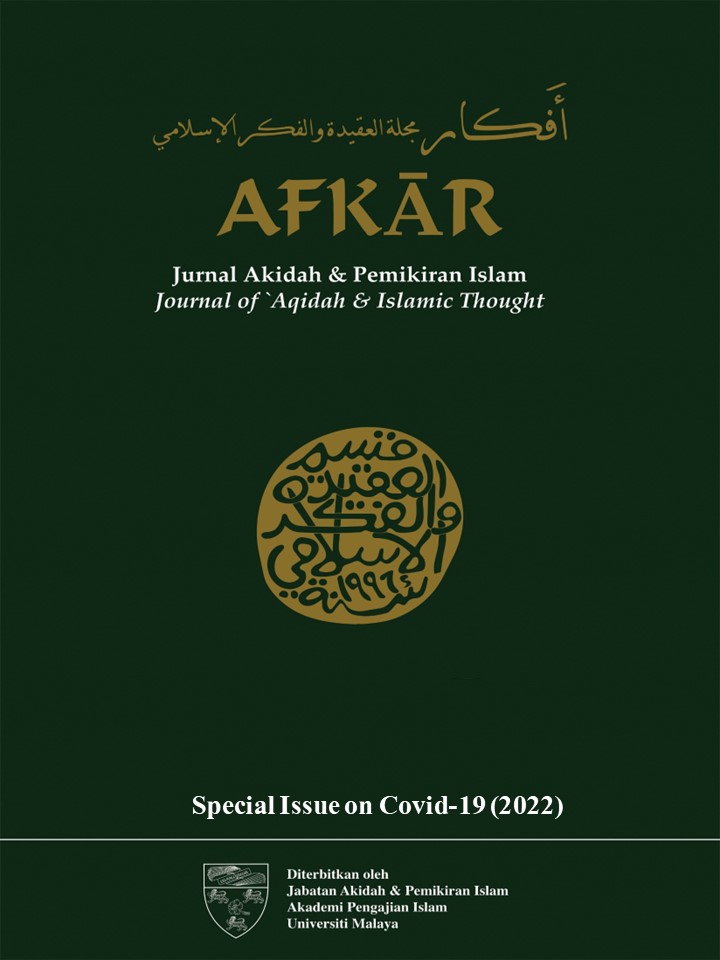Responding to Covid-19 Pandemics and Afflictions: A Sufi Perspective
DOI:
https://doi.org/10.22452/afkar.sp2022no1.1Keywords:
Covid-19 pandemic; Divine mercy; ibtilā’; tawbah; Islamic worldviewAbstract
This paper is an attempt to approach the Covid 19 pandemic from the vantage point of the Sufi tradition which is the spiritual dimension of Islam. Based on the guidance of the Qur’ān and the Prophetic examples, Sufis have contributed to the Islamic spiritual and psychological domains to the extent that their science, Tasawwuf, itself was termed by them Psychology, ʻilm al-nafs. Utilizing some of the basics of their tradition and employing analytic methodology accompanied by insights from semantics, philosophy, psychology, and history, the paper endeavours to present the Sufi approach to pandemics in simple language. The aim is to draw attention to this usually ignored approach in the context of this pandemic and to highlight some of what, I believe to be useful means of solace for the modern man who is caught between the rim and axis of this affliction. It also can provide him with some necessary inspiration as to how to free himself from depression and be optimistic, especially in times of pandemics and afflictions. The paper also seeks to remind the reader of the importance of the worldview one holds in any discussion related to human life and cosmic events.
Downloads
References
Armstrong, Karen. Fields of Blood: Religion and the History of Violence. London: Vintage, 2015.
Al-Bisṭāmī, Abū al-Faḍl Muḥammad bin ʻAlī al-Sahlajī. “Al-Nūr min Kalimāt Abī Ṭayfūr.” In Shaṭaḥāt al-Ṣūfiyyah, ed. ʻAbd al-Raḥmān Badawī’s. Kuwait: Wakālat al-Maṭbūʻāt, 1978.
Al-Bukhārī, Muḥammad bin Ismāʻīl. Al-Jāmiʻ al-Ṣaḥīḥ, ed. Muḥammad Zuhayr bin Nāṣir. Beirut: Dār Ṭawq al-Najāt, 1422H.
Ernst, Carl. Sufism: An Introduction to the Mystical Tradition of Islam. Boston & London: Shambhala, 2011.
Fox, Judith M. Osho Rajneesh. USA: Signature Books Publishing, 2000.
Haldeman, Bonnie. Memories of the Branch Davidians: The Autobiography of David Koresh’s Mother, edited by Catherine Wessinger. Waco, Texas: Baylor University Press, 2007.
Al-Makkī, Abū Ṭālib. Qūt al-Qulūb, ed. ʻĀṣim Ibrāhīm al-Kayālī. Beirut: Dār al-Kutub al-ʻIlmiyyah, 2005.
Mawdūdī, Sayyid Abul Aʻlā. 2006/1427. Towards Understanding the Qur’an: Abridged version of Tafhīm al-Qur’ān, translated and edited by Zafar Ishaq Ansari. Leicester, UK: The Islamic Foundation.
Muslim bin Ḥajjāj. Al-Musnad al-Ṣaḥīḥ, ed. Muḥammad Fu’ād ʻAbd al-Bāqī. Beirut: Dār Iḥyā’ al-Turāth al-ʻArabī, n.d.
Al-Naqshbandī, Muḥammad Bahā’ al-Dīn. Al-Wird al-Naqshbandī, edited with commentary by Muḥammad Amīn al-Kurdī with an epilogue by Najm al-Dīn al-Kurdī. Cairo: Dār al-Muṣṭafa, 1424H/2003.
Nasr, Seyyed Hossein, Dagli, Caner K., Dakake, Maria Massi, Lumbard, Joseph E. B. & Rustom, Mohammed. eds. The Study Quran: A New Translation and Commentary. New York: HarperOne, 2015.
Al-Qushayrī. Al-Risālah al-Qushayriyyah (Al-Qushayri’s Epistle on Sufism), translated by Alexander D. Knysh. Reading, UK: Garnet Publishing, 2007.
Al-Simnānī, ʻAlā’ al-Dawlah. Al-Wārid al-Shārid al-Ṭārid Shubhat al-Mārid, critical edition with translation by Giovanni Maria Martini in ‘Alā’ al-Dawla al-Simnānī Between Spiritual Authority and Political Power: A Persian Lord and Intellectual in the Heart of the Ilkhanate. Leiden & Boston: Brill, 2018.
Downloads
Published
How to Cite
Issue
Section
License

This work is licensed under a Creative Commons Attribution-NonCommercial 4.0 International License.









